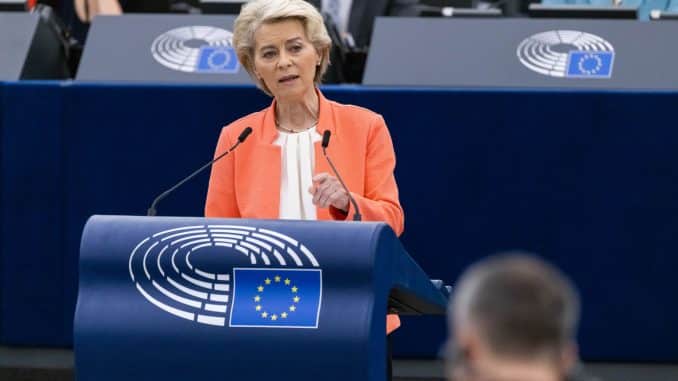
Temporarily capping the price of gas – along with price negotiations with gas suppliers and joint purchases – should bring down energy prices in the European Union, European Commission President Ursula von der Leyen said on Wednesday.
“Introducing a cap on gas overall is a temporary solution” and should be “designed properly to ensure security of supply,” von der Leyen said at the European Parliament in Strasbourg, France.
As a first step, gas used to generate electricity could be capped, von der Leyen said. “But I think we also have to have a look at gas prices beyond the electricity market.”
Limiting gas prices should help reduce price volatility, she noted, without providing additional details on the design of the proposed price caps.
Von der Leyen is also counting on negotiating lower prices with gas suppliers like Norway and joint gas purchases of EU countries to reduce energy prices.
“In pursuing our action, the two same things remain paramount: that is action in unity and action in solidarity,” von der Leyen said.
Measures taken by EU countries should “preserve a level playing field within the European Union,” she said.
Von der Leyen’s remarks come as Germany’s €200 billion ($198.2 billion) aid package has drawn criticism as other EU countries might not be able to afford similar packages and amid calls for a gas price cap from several capitals.
The commission president said she will detail these points in a letter to EU leaders ahead of a two-day summit meeting in Prague starting on Thursday.
Von der Leyen said EU countries had made progress in reducing their dependency on Russian fossil fuels since Russia invaded Ukraine in February.
Russia has significantly reduced its energy exports to the EU, which is seen as retaliation for the EU’s support for Ukraine and sanctions on Russia, a reaction to Russia’s ongoing invasion. This has led to a sharp rise in prices as EU countries rush to buy gas elsewhere.
In future, 7.5% of gas imports to the EU would come from Russia, compared to 41% before the war, von der Leyen said.
Gas storage facilities in the bloc are now filled at 90%, she noted, after countries managed to buy gas from other export nations like Norway, Algeria or the US.
Courtesy © dpa Deutsche Presse-Agentur GmbH www.dpa.com